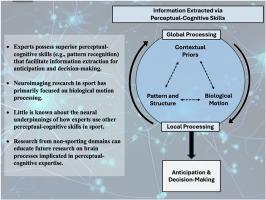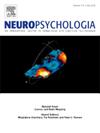Neuroimaging and perceptual-cognitive expertise in sport: A narrative review of research and future directions
IF 2
3区 心理学
Q3 BEHAVIORAL SCIENCES
引用次数: 0
Abstract
Perceptual-cognitive expertise is crucial in domains that require rapid extraction of information for anticipation (e.g., sport, aviation, warfighting). Yet, published reports on the neuroscience of perceptual-cognitive expertise in such dynamic performance environments focus almost exclusively on biological motion processing (i.e., action observation network), leaving gaps in knowledge about the neural mechanisms underlying other frequently cited perceptual-cognitive skills, such as pattern recognition, the use of contextual priors, and global processing. In this paper, we provide a narrative review of research on the neural mechanisms underlying perceptual-cognitive expertise in sport, a domain where individuals possess highly specialized perceptual-cognitive skills (i.e., expertise) that enable successful performance in dynamic environments. Additionally, we discuss how work from domains with more static, predictable stimuli for perception and decision-making (e.g., radiology, chess) can enhance understanding of the neuroscience of expertise in sport. In future, efforts are needed to address the neural mechanisms underpinning less studied perceptual-cognitive skills (i.e., pattern recognition, contextual priors, global processing) and to explore how experts prioritize these skills within different contexts, thereby enhancing our understanding of perceptual-cognitive expertise across numerous professional domains.

体育运动中的神经成像和感知认知专长:研究综述和未来方向。
在需要快速提取信息进行预测的领域(如体育、航空、作战),感知-认知专长至关重要。然而,已发表的关于此类动态表演环境中感知-认知专业技能的神经科学报告几乎只关注生物运动处理(即动作观察网络),这使我们对其他经常被提及的感知-认知技能(如模式识别、语境先验的使用和全局处理)的神经机制的了解存在空白。在本文中,我们对体育运动中感知-认知专长的神经机制研究进行了叙述性综述,在体育运动中,个体拥有高度专业化的感知-认知技能(即专长),以适应动态的表演环境。此外,我们还讨论了在感知和决策方面具有更静态、更可预测的表现环境的领域(如放射学、国际象棋)中开展的工作如何能够加深对体育运动中专业技能的神经科学的理解。未来,我们需要努力弥补对其他研究较少的感知认知技能(即模式识别、语境先验、全局处理)的神经机制的认识差距,并探索专家如何在不同的语境中优先考虑这些技能,从而增强我们对众多专业领域的感知认知专长的理解。
本文章由计算机程序翻译,如有差异,请以英文原文为准。
求助全文
约1分钟内获得全文
求助全文
来源期刊

Neuropsychologia
医学-行为科学
CiteScore
5.10
自引率
3.80%
发文量
228
审稿时长
4 months
期刊介绍:
Neuropsychologia is an international interdisciplinary journal devoted to experimental and theoretical contributions that advance understanding of human cognition and behavior from a neuroscience perspective. The journal will consider for publication studies that link brain function with cognitive processes, including attention and awareness, action and motor control, executive functions and cognitive control, memory, language, and emotion and social cognition.
 求助内容:
求助内容: 应助结果提醒方式:
应助结果提醒方式:


